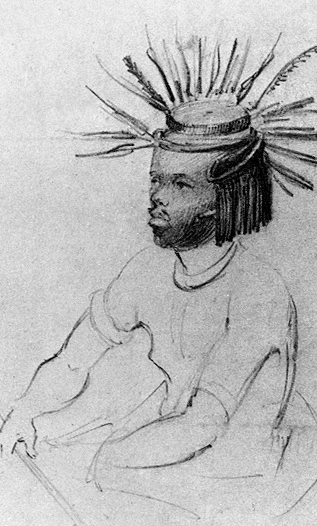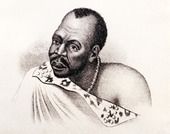After existing as a kingdom for over 800 years, the Ama-Mpondomise-people were stripped of their Royal status by the Union of South Africa in 1904 after King Mhlontlo KaMatiwane was accused of killing a Qumbu magistrate, Hamilton Hope, and two white police officers during the Mpondomise Revolt in 1880-81. Although King Mhlontlo KaMatiwane was acquitted of the murder charge, he lost his kingship by administrative action. The Ama-Mpondomise-nation’s hopes were again dashed during the democratic dispensation when the Nhlapo Commission found in 2005 that they had no claim to a kingship. However, a 115-year battle, for this anti-colonial nation, to get their king and kingdom reinstalled and reinstated respectively, ended when the Eastern Cape High Court (Mthatha) officially recognised the Ama-Mpondomise's-kingship. It ordered that the kingship be reinstated. With the presiding judge setting aside the Tolo Commission's decision to oppose the Ama-Mpondomise’s claim of kingship. [15]
Genealogy of kings
The most prominent of all the kings of the Ama-Mpondomise was King Myeki. Both royal houses include him in their clan names.
- King Sibiside [Fathered: Prince Njanya & Prince Shange & Prince Ngcongo & Prince Hlengwa & Princess Madlebe & Princess Lebuka & Princess Nomafu]
(Born:1120-Died:1202)
- King Njanya [Fathered: Prince Mpondo & Prince Mpondomise & Prince Xesibe & Prince Nyambose & Prince Chibi]
(Born:1151-Died:1225)
- King Mpondomise [Fathered: Prince Snduntu & Prince Hlahlane & Prince Vamba]
(Born:1205-Died:1277) [Reigned:1225 Till 1277]
- King Snduntu [Fathered: Prince Nxunxa]
(Born:1229-Died:1304) [Reigned:1277 Till 1304]
- King Nxunxa [Fathered: Prince Blambeza]
(Born:1263-Died:1346) [Reigned:1304 Till 1346]
- King Blambeza [Fathered: Prince Malangana]
(Born:1291-Died:1368) [Reigned:1346 Till 1368]
- King Malangana [Fathered: Prince Sikhomo]
(Born:1322-Died:1385) [Reigned:1368 Till 1385]
- King Sikhomo [Fathered: Prince Rhudulu & Prince Hlombose]
(Born:1348-Died:1410) [Reigned:1385 Till 1410]
- King Hlombose [Fathered: Prince Ntose]
(Born:1376-Died:1443) [Reigned:1412 Till 1443]
who was assisted by his maternal uncle Prince Rhudulu Ka-Sikhomo led the Aba-Mbo movement from their third settlement in Natal/Swatini, settled near the source of a mysterious river called Dedesi. This is where they resided with Ama-Xhosa-kingdom and Aba-Thembu-kingdom under the King Togu Ka-Sikhomo and King Hala Ka-Dhlomo respectively. Ama-Mpondo-kingdom crossed the Mzimkhulu river first and. Hlombose’s great son and heir Ntose took over on the demise of King Hlombose.
- King Ntose [Fathered: Prince Ngcwina & Prince Cwerha & Prince Mpinga & Prince Dhlombo & Prince Debeza & Prince Nqukhwe & Prince Hlongothi & Prince Gxarha & Prince Ntsikhwe]
(Born:1409-Died:1461) [Reigned:1443 Till 1461]
- Regency-King Cwerha [Fathered:????????] (he was a regent for his younger brother King Ngcwina Ka-Ntose who was next in line to the Ama-Mpondomise-throne because their father King Ntose Ka-Hlombose died while Ngcwina was still in a process of entring a initietion school)
(Born:1428-Died:1493) [Held-Power:1461 till 1464]
- King Ngcwina [Fathered: Prince Cirha & Prince Dosini & Prince Nxothwe & Prince Nxamase & Prince Ngcinase & Prince Ngcitshana & Prince Gcaga & Prince Ngqukatha & Prince Bhukwana & Prince Zumbe]
(Born:1434-Died:1498) [Reigned:1464 Till 1498]
- King Cirha [Fathered: Prince Sabe & Princess Lodumo]
(Born:1469-Died:1522) [Reigned:1498 Till 1522]
- King Sabe [Fathered: Prince Mhlande & Prince Mhagana & Prince Krhancolo & Prince Gqwetha & Prince Gqubusha]
(Born:1493-Died:1545) [Reigned:1522 Till 1545]
- King Mhlande [Fathered: Prince Nvongeza & Prince Ngxabane]
(Born:1518-Died:1567) [Reigned:1545 Till 1567]
- King Nvongeza [Fathered: Prince Qengeba]
(Born:1540-Died:1592) [Reigned:1567 Till 1592]
- King Qengeba [Fathered: Prince ("Majola") Jongolunde & Prince Tshanzi]
(Born:1561-Died:1624) [Reigned:1592 Till 1624]
- King ("Majola") Jongolunde [Fathered: Prince Dhlazane]
(Born:1585-Died:1653) [Reigned:1624 Till 1653]
- King Dhlazane [Fathered: Prince Ngwanya & Prince Njomose]
(Born:1612-Died:1675) [Reigned:1653 Till 1675]
- King Ngwanya [Fathered: Prince Phahlo]
(Born:1644-Died:1708) [Reigned:1675 Till 1708]
- King Phahlo [Fathered: Prince Sonthlo & Princess Mbingwa & Prince Mgabisa & Prince Sixhuba]
(Born:1665-Died:1732) [Reigned:1708 Till 1732]
- Queen Mbingwa [Mothered:she never had children of her own] or otherwise known as (Mamani kaPhahlo) (She was the eldest daughter of King Phahlo ka-Ngwanya of all his Female children, and she became queen in her own right and influenced the succession of her brother king Sonthlo Ka-Phahlo).
(Born: 1702 – Died: 1758) [Reigned:1732 till 1758] [16] )
- King Sonthlo [Fathered: Prince Mngcambe & Prince Hlontshi]
(Born:1718-Died:1771) [Reigned:1758 Till 1771]
- Regency-King Mgabisa [Fathered: Prince Velelo] (he was a regent for his nephew King Mngcambe Ka-Sonthlo who was away training in a initiation school center but then when he returned home his uncle who was the caretaker for the throne refused to hand over the reins to him then war broke out which led to his being killed in battle)
(Born: 1725 – Died: 1785) [Held power: 1771–1785]
- King Mngcambe [Fathered: Prince Myeki & Prince Gxumisa & Prince Notshweleka & Prince Xhoki]
(Born:1745-Died:1807) [Reigned:1785 Till 1807]
- Regency-King Velelo [Fathered: Prince Diko] (He was a regent for his cousin King Myeki Ka-Mngcambe who was away in a initiation school preparing for his leadership on the Ama-Mpondomise-Throne but then same that happened with his father and great grand uncle who fought for the Throne happened to him too but than his cousin who was a caretaker for the nation fled the bettle ground and excaped opening a way for King Myeki to take his place on the throne)
(Born:1753-Died:1820) [Held-Power:1807-1814]
- King Myeki [Fathered: Prince Matiwane & Prince Mtshotsho & Prince Mbhali & Prince Ndamane Prince Mcelu]
(Born:1778-Died:1851) [Reigned:1814 Till 1851]
- King Matiwane [Fathered: Prince Mhlontlo & Prince Xhabadiya & Prince Matshiki & Prince Noqholo]
(Born:1803-Died:1865) [Reigned:1851 Till 1865]
- Regency-King Mbhali [Fathered:????????] (He was a regent for his nephew King Mhlontlo Ka-Matiwane who was not prepared for his leadership role when his father King Matiwane Ka-Myeki who was Killed by Ama-Bhaca-People in Bettle so then his uncle held-power for him until his under the initiation process in order to sit on the Ama-Mpondomise-Throne)
(Born:1815-died:1880) [Held-Power:1865-1870]
- King Mhlontlo [Fathered: Prince Tshalisi & Prince Ntabankulu]
(Born:1837-Died:1912) [Reigned:1870 Till 1912]
- King Tshalisi [Fathered: Prince Sigidi & Prince Dailiza]
(Born:1881-Died:1936) [Reigned:1912 Till 1936]
- Regency-King Ntabankulu [Fathered:????????] (he was a Regent for his nephew King Sigidi Ka-Tshalisi because he was too young to rule Ama-Mpondomise-People so then his uncle had to hold the throne for him until he was old enough to rule on his own which he did and allowed him to take back his place on the royal sit and there was no bad blood when handing over the reins to him)
(Born:1895-Died:1968) [Held-Power:1936-1939]
- King Sigidi [Fathered:he never had children of his own] (He was first to be king but than he died before he could produce his own Children so than the royal family decided give the throne to his younger brother.)
(Born:1919-Died:1962) [Reigned:1939 Till 1962]
- King Dailiza [Fathered: Prince Welisha]
(Born:1921-Died:1984) [Reigned:1962 Till 1984]
- King Welisha [Fathered: Prince Zwelozuko & Prince Zwelitsha]
(Born:1953-Died:2018) [Reigned:1984 Till 2018]
- King Zwelozuko [Fatherd:????????] (He is the current reigning monarch of Ama-Mpondomise-people in
south Africa today) or otherwise known as (Luzuko (Born:1978-Alive:Aging) [Reigning:since 2018 Till Present-Date]
Prince Luzuko is yet to ascend the throne. His coronation has been delayed by the Dosini royal line's unsuccessfully contest for the succession. [17]
- Dosini’s descedants in terms of the Ama-Mpondomise Kingship claimants were: Dosini - Nqabashe-Nceleduna - Mqhorana - Hala - Marule - Mxoko - Gxaba - Nyakatya - Sigiwili - Masethi (from whom this royal family derives its surname)- Ntamnani - Myezo - Ntombenkonzo. Ntombenkonzo is the current claimant from this line. She has lost the case in court -see court papers in references [18]










